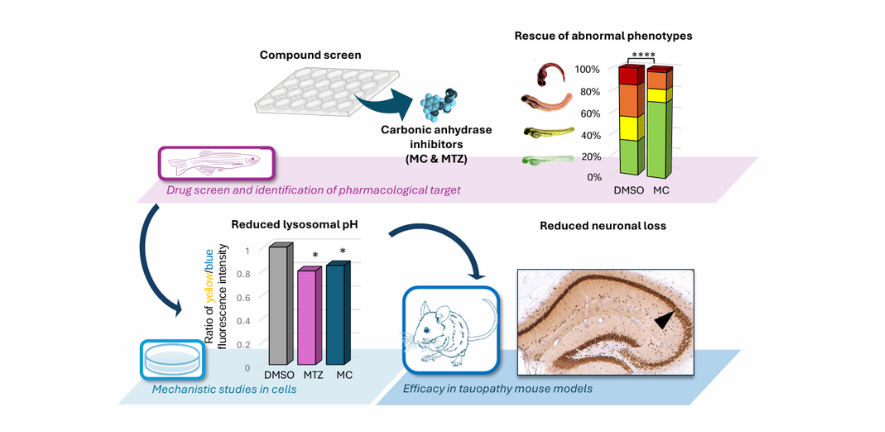
Submitted by Emily Rigby on Thu, 07/11/2024 - 14:39
A new study published by the Fleming lab reveals a novel strategy for treating neurodegenerative disorders.
Tauopathies are neurodegenerative diseases which show intracellular accumulation and aggregation of tau protein. In diseases such as Pick's disease, progressive supranuclear palsy, corticobasal degeneration, and argyrophilic grain disease, tau is believed to be the primary disease driver. Additionally, there are several secondary tauopathies, such as Alzheimer’s disease, where the tau accumulation appears to be secondary to a distinct upstream cause, but nevertheless is believed to be an important driver of neurodegeneration.
Most large compound screens to identify tauopathy modulators have been performed in cell culture. However, such screens do not faithfully recapitulate the in vivo environment with its diversity of cell types. In this new paper, researchers from PDN used a transgenic zebrafish model of tauopathy to test over 1400 clinically-approved compounds. This revealed that carbonic anhydrase (CA) inhibitors protected against tau toxicity. CRISPR knockdown experiments confirmed CA depletion mimicked the effects of these drugs. With colleagues from Professor David Rubinsztein’s lab at CIMR, this protective effect was found to result from accelerated clearance of human tau via lysosomal exocytosis. Importantly, methazolamide (a CA inhibitor which is prescribed for use in people with glaucoma) reduced tau levels, increased neuronal survival and ameliorated neurodegeneration in mouse tauopathy models at concentrations similar to those seen in people. These data underscore the feasibility of in vivo drug screens using zebrafish models and suggest serious consideration of CA inhibitors for treating tauopathies.
To read the full paper, visit Nature Chemical Biology website: https://www.nature.com/articles/s41589-024-01762-7
Reference: Lopez A*, Siddiqi FH*, Villeneuve J, Ureshino RP, Jeon HY, Koulousakis P, Keeling S, McEwan WA, Fleming A, Rubinsztein DC. Carbonic anhydrase inhibition ameliorates tau toxicity via enhanced tau secretion. Nat Chem Biol. 2024 Oct 31. doi: 10.1038/s41589-024-01762-7.

